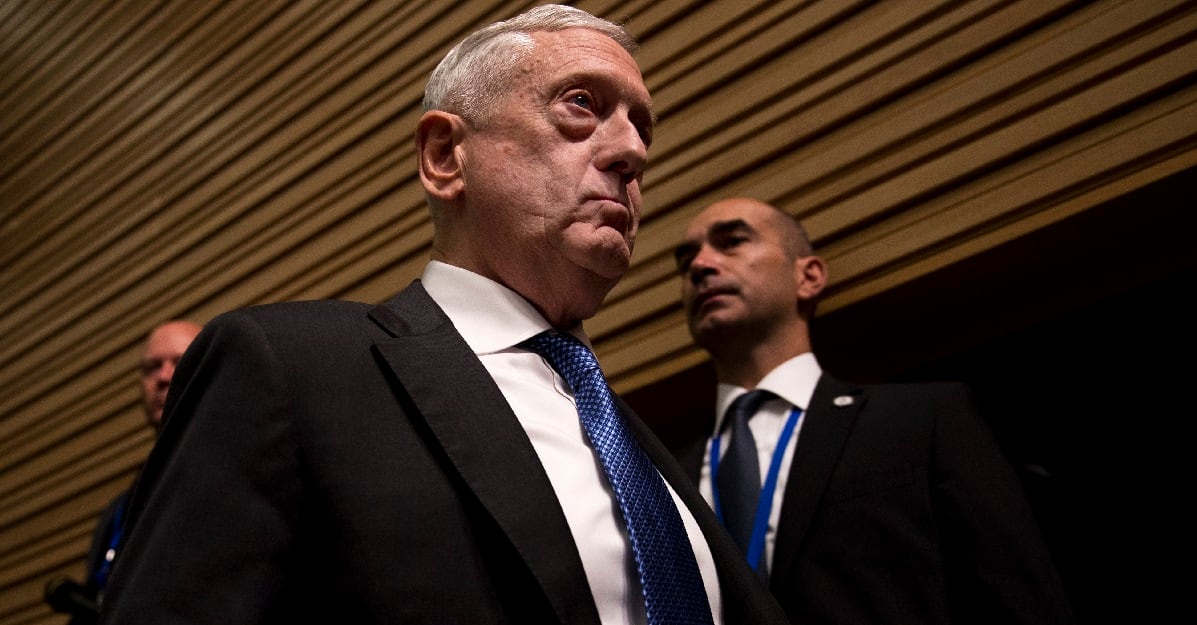WASHINGTON — U.S. Defense Secretary Jim Mattis and two top Republican lawmakers met with President Donald Trump at the White House on Tuesday to argue against a $33 billion budget cut he’s considering for the military. Their strategy was to link budget problems to Trump’s sometime-foil, President Barack Obama.
Mattis, Senate Armed Services Committee Chairman Jim Inhofe and House Armed Services Committee Chairman Mac Thornberry held the meeting to discuss the administration’s 2020 budget submission. News of the plans to meet were first reported by The Washington Post.
“I had a frank and productive conversation about our national security goals with the President," Inhofe said in a statement. "We share a commitment to undoing the damage left behind by President Obama and to rebuilding our military to achieve the National Defense Strategy.
"I am confident from the meeting that the President is determined to keep our nation strong and the military adequately funded. I look forward to continuing to work with President Trump and Vice President Pence to achieve these shared goals.”
A HASC aide said similarly that participants in Tuesday’s meeting, "reviewed the damage done to the military during the Obama Administration. President Trump has been keeping his promise to repair that damage and restore our strength. The participants believe we continue to make progress and are still on track to rebuild the military.”
The meeting appeared to be an end-run around the White House Office of Management and Budget. Pro-defense Republicans have been lobbying the president since the budget office ordered the Pentagon to create a $700 billion defense budget (in addition to a $733 billion budget it had previously planned) as part of plans for all departments across the federal government to cut their planned budgets by 5 percent.
The lawmakers appealed to Trump by suggesting Obama was responsible for suboptimal defense budgets, though it’s a complicated claim because Obama was constrained by the bipartisan 2011 Budget Control Act’s caps on discretionary spending and because Congress’s penchant for last-minute budget deals shares some of the blame.
Cutting the military could look like a reversal for Trump, who accused Obama of leaving the military “depleted,” campaigned to “rebuild the military” and championed hard-won defense spending increases for 2018 and 2019. Trump seemed to double down on a cut for FY20 with an ambiguous tweet Monday that called the $716 billion defense budget he signed for 2018, “Crazy!”
Last week, Inhofe and Thornberry argued in a Wall Street Journal op-ed that a smaller defense budget won’t have a major impact on fixing the national deficit but will have a crippling effect on military equipment purchases and end-strength.
On Saturday, Mattis told the audience at the Reagan National Defense Forum that major budget cuts “would be a dangerous disservice to our troops and the American people they serve and protect" — and signaled he would be lobbying the president.
“I would just tell you that the issue is in play, and I’ll give my advice to the president. I owe him the courtesy of that in private before I speak about it in public," Mattis said.
“It’s up to me to make the logical argument about what the president’s submission should look like to the Office of Management and Budget, to the Congress ... at that point, the Congress will take our input on board."
RELATED

In the era of budget caps, defense hawks in Congress have had to navigate GOP fiscal hawks and Democrats seeking parity between defense and non-defense spending. They will have an uphill battle as HASC ranking member Rep. Adam Smith, D-Wash. — who has argued for cutting defense spending — is expected to replace Thornberry as chairman next year.
Asked earlier in the day about the planned White House huddle, Sen. Jack Reed, the top Democrat on the Senate Armed Services Committee and a senior appropriator, said the defense budget cannot be discussed in isolation. That’s because easing BCA caps have required high-level negotiations between the president and congressional leaders from both parties.
“There has to be a broader conversation about the whole budget, simply from the standpoint of national security, not just defense,” said Reed, of Rhode Island. “It’s the State Department, the FBI. Until there’s a conversation between leadership and the White House about the top-line for everything, we’re not being efficient and effective.”
Joe Gould was the senior Pentagon reporter for Defense News, covering the intersection of national security policy, politics and the defense industry. He had previously served as Congress reporter.








